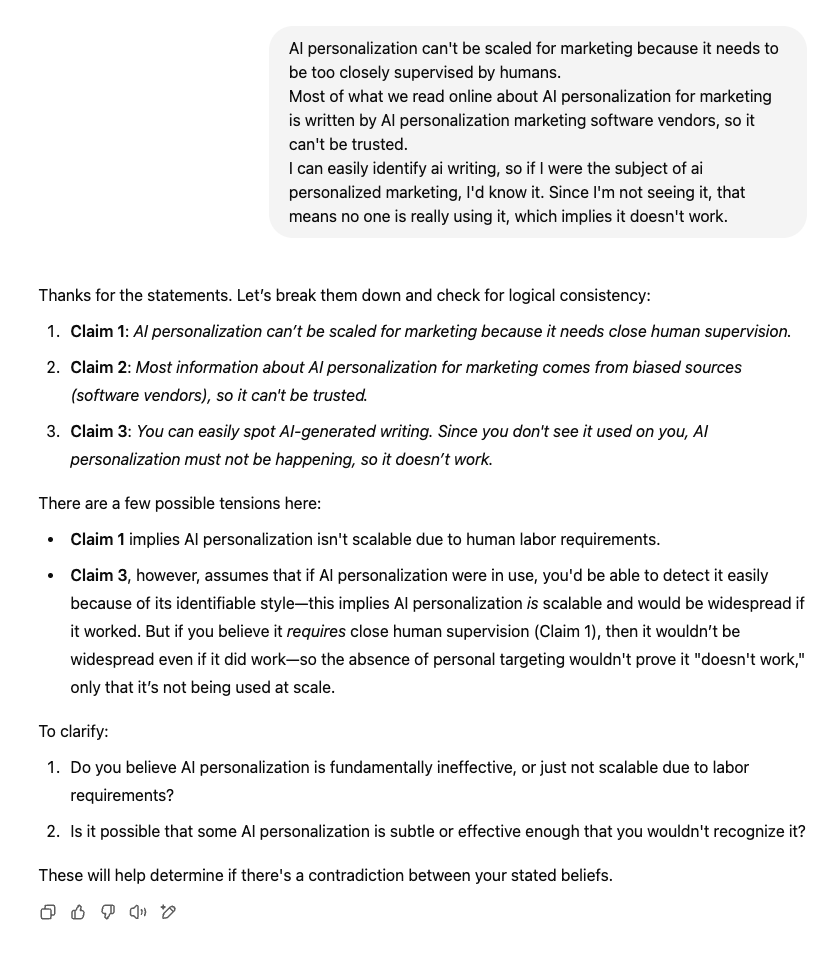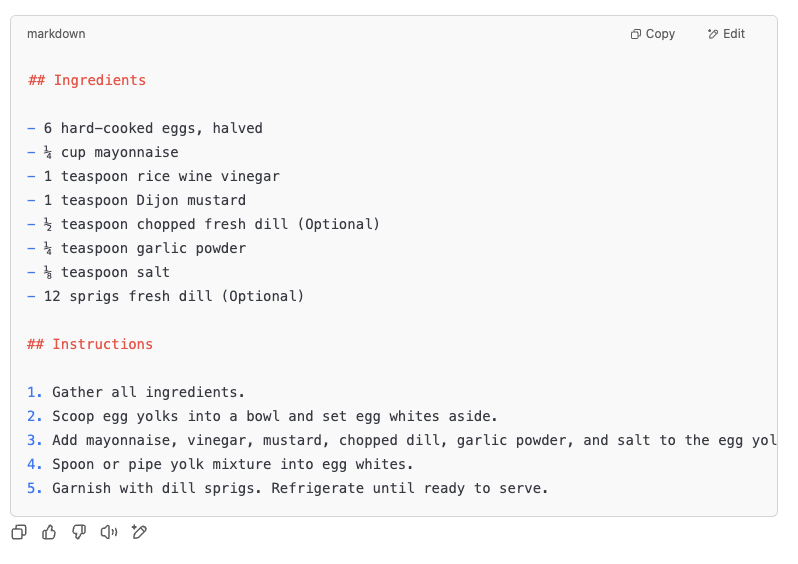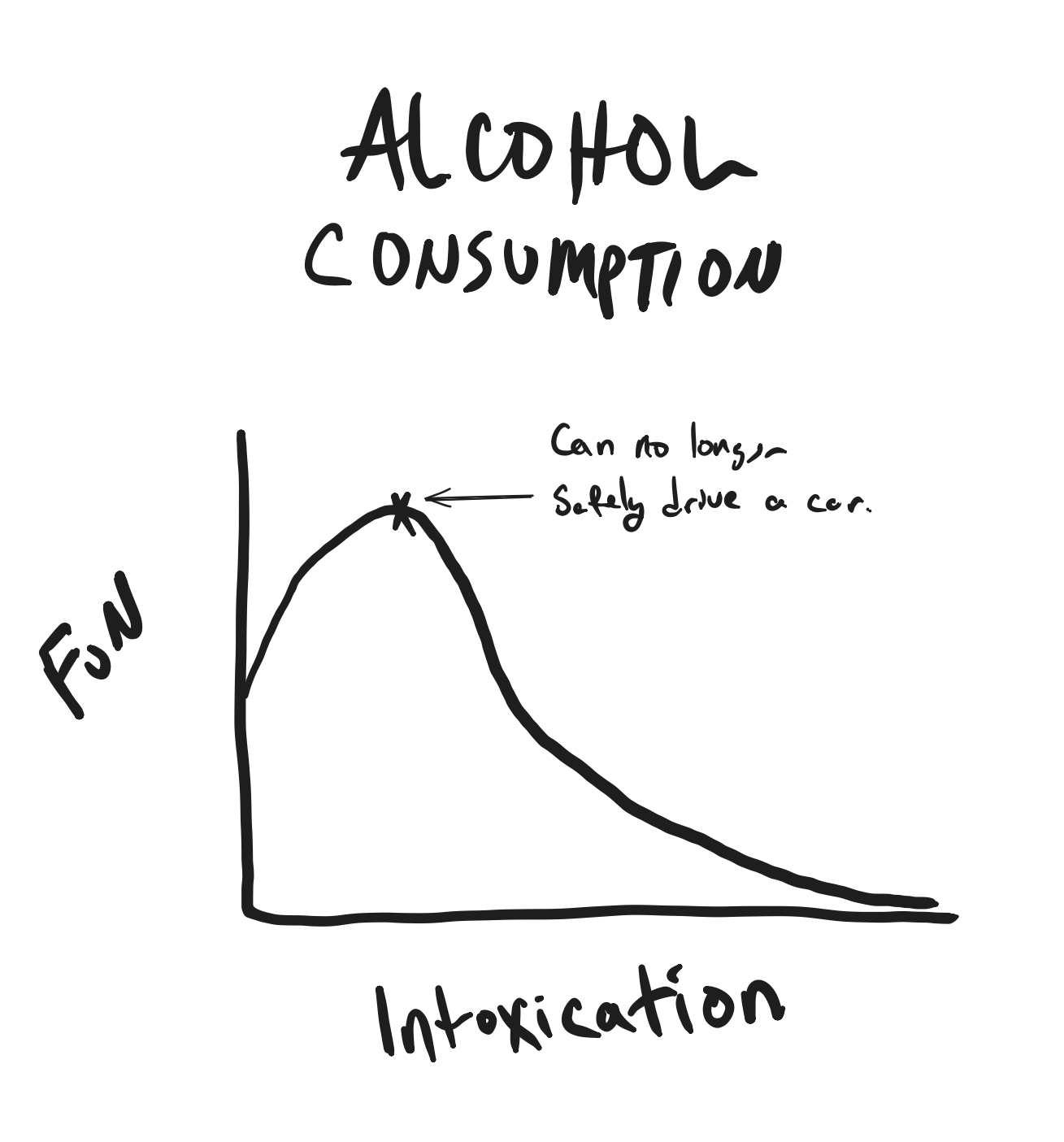How I use AI
I got my first computer in the mid nineties, just before Windows 95 was released. In 1995, the internet was still a technical novelty. It was a largely text-based network accessible primarily to early adopters.
Two decades later, a lack of digital literacy is disqulifying for all knowledge work.
Today, we stand at a similar inflection point with artificial intelligence. Those who develop AI literacy now will enjoy substantial advantages, while late adopters may find themselves struggling to catch up.
I witnessed firsthand how early technical literacy provided a significant edge during my academic and early professional career.
That experience informs my perspective on today's AI revolution: we are witnessing the emergence of a new digital divide. This divide separates AI-fluent professionals from those who remain on the sidelines.
The Temporary Advantage Window
Estimates for achieving artificial general intelligence (AGI) range from a few years to several decades.
Eventually, AI will become so intuitive that specialized knowledge about prompting techniques or AI capabilities won't confer any particular advantage. But we're not there yet.
This gap between today's reality and tomorrow's inevitability creates a window of opportunity.
Those who develop AI literacy now will harness capabilities that remain inaccessible or mysterious to the majority of professionals.
Much like internet adoption in the 1990s, this advantage will erode over time, but early adopters stand to benefit significantly in the interim.
Getting Started
The first step toward developing AI literacy is securing access to capable tools. While free options exist, anyone serious about leveraging AI should consider premium services like ChatGPT Plus. At $20 per month, it represents a modest investment compared to the potential productivity gains.
I recommend using the most advanced models on the entry-level paid their its messaging limits, then consider upgrading further (something I'm considering now).
The question isn't whether these services are worth their subscription fees, but rather: what is the opportunity cost of not having access to these tools while others in your position do?
The Mental Model Shift
The transition from traditional computing to AI-assisted work demands a fundamental shift in how we see our relationship with technology.
Rather than viewing AI as either omniscient or useless, successful adopters understand that it represents something entirely new: a thinking partner with distinct strengths and limitations.
It's best to approach the technology with appropriate skepticism, particularly for high-stakes decisions. After pushing past initial frustration over hallucinations, you'll figure out when you can trust AI-sourced information (generally for widely documented facts) and when to verify through traditional means (for obscure details or emerging information).
Most importantly, remember that initial failures don't define the technology's usefulness.
Just as a poor golf score rarely stems from faulty clubs, disappointing AI outputs typically result from ineffective prompts or misaligned expectations rather than inherent limitations of the technology.
Practical Applications: How I Use AI Daily
Below is a list of specific things I do with AI. In most cases, there's a noticeable difference between the higher-end and the free models. (As of this writing, ChatGPT o3 is the best model I have access to).
Ideation and Creativity
AI excels at connecting disparate concepts and generating variations on existing ideas. These applications don't replace human creativity but amplify it. They allow exploration of more possibilities in less time.
- Connect seemingly unrelated ideas into new concepts
- Brainstorm by providing topics and requesting additional related subtopics
- Generate multiple variations on existing ideas
- Create content "in the style of" particular writers or publications
- Get feedback on my arguments, identifying weaknesses and blind spots
Example
I created a custom GPT that I named Contradiction Detector. To use it, I enter a few statements which I believe to be true. If there are no immediately identifiable contradictions, it'll ask clarifying questions in an attempt to uncover them. The goal here is to help me clarify my thinking.
Here's a screenshot of a time I recently used it to prepare for an article I was writing on AI hyper-personalization.

Writing and Editing
Clear writing requires structure, flow, and appropriate tone. AI serves as a powerful assistant. For those who struggle with perfectionism when writing important communications, AI provides a path through to productivity.
- Transform stream-of-consciousness notes into coherent outlines
- Ensure logical progression between concepts
- Clean up and format text (like converting bolded text into proper heading hierarchies)
- Drafting emails with the right tone, helping overcome analysis paralysis
Example
When preparing this article, I experienced firsthand how AI can strengthen creative work:
- After drafting an initial outline, I asked ChatGPT, "What's missing from my article?"
- It responded with structured writing prompts that identified gaps in my thinking.
- I then requested it to "ask me questions and integrate my answers" into the draft.
- The resulting exchange produced meaningful questions that significantly improved the piece.
This collaborative process led to insights I would have overlooked working alone.
Research and Learning
While AI doesn't replace deep expertise on any given topics, it's smarter than most humans. Up until recently it could explain technical concepts very well but not math or count. Newer models seem to have solved that.
- Synthesize information from multiple sources
- Filter out promotional content in favor of substantive analysis (for example, it's good at excluding content marketing from vendors when researching new software)
- Translate foreign-language materials
- Explain complex concepts in accessible terms
- Find the perfect word when you only have a rough definition
Example
There's been lots of progress here. Deep Research and o3 are incredible at scouring the web for information. But an often overlooked tool is NotebookLM, which references only documents you provide it. I use it to query survey data, and parse it into talking points for our sales team. The great thing about NotebookLM is that every time it makes a claim, it links to where it found that information in your provided documents.
Technical Problem-Solving
For me, life presents an ever-expanding array of technical challenges outside my core expertise. AI's capability allows me to push projects forward rather than waiting for specialized technical assistance or spending hours re-learning skills I use infrequently.
- Fix HTML and other technical issues
- Write complex spreadsheet formulas
- Cleaning and structuring data (for example, splitting mailing addresses into discrete fields)
- Iterate on code by explaining what existing code does and implementing requested changes
Example
I'm not a web developer (or a developer of any kind for that matter). AI helped me make this very website, which costs me nothing and contains no ads. It found me a free web host and CMS, then walked me through setting the whole thing up in under 30 minutes.
Summarizing and Organizing
I struggle to take accurate notes in meetings while also paying full attention to the participants, so I record and transcribe everything, then use AI to summarize everything after the fact. This application is particularly valuable if you've ever found yourself re-listening to recordings at 2x speed.
- Summarizing meeting recordings and calls
- Identifying key points from lengthy discussions
- Organizing information into structured formats
- Extracting action items from conversations
Examples
Fathom.video, fireflies.ai, granola.ai, otter.ai
Entertainment and Personal Use
Beyond professional applications I use AI quite a bit in my personal life.
- Create detailed characters for role-playing games like D&D
- I evaluate board games based on specific criteria like player interaction
- Get personalized book, movie, and music recommendations (it's often more reliable than platforms like Goodreads, which have demographic biases)
- Modify recipes to accommodate dietary restrictions or available ingredients (AI is not good at creating original recipes from scratch, but it's remarkably effective at adapting existing ones to suit my needs)
- Reformatting copy/pasted recipes from the web into Markdown for Obsidian.
Example
I use Obsidian for my documenting my life. In it, I keep all my favorite recipes. I have a template that includes the name of the recipe, an image, a bulleted list of ingredients under an "Ingredients" header, numbered list of instructions under an "Instructions" header, and a "Notes" header that I fill in later.
When copy/paste recipes from the web directly into Obsidian, it brings over lots of formatting junk: bits of ads, misaligned margins, etc. I use a Custom GPT to take the relevant info from the recipe and put it into my structure and then spit out in markdown, which I can easily copy/paste into Obsidian and have perfect formatting.

Common Mistakes and Misconceptions
The path to AI literacy includes lots of predictable obstacles. These are all easy to overcome, but require a good faith effort.
- Premature dismissal: Many people try a few basic prompts, receive unsatisfactory results, and conclude that AI offers limited value. Successful adopters persist through this initial learning curve. They course-correct with AI when it's going in the wrong direction, as they would with a human.
- Binary thinking: Viewing AI as either magical or useless prevents nuanced understanding of its capabilities. Reality lies between these extremes.
- Inadequate instructions: AI works best with specific guidance to produce the best results. Vague prompts often lead to overly detailed outputs of something you don't really need. Detailed instructions in your first message, however, followed by iterative refinement, typically leads to excellent results.
- Misplaced blame: When AI produces disappointing results, the issue often lies with the prompting approach rather than the technology itself.
- Unrealistic expectations: AI can't do everything well. There are many things it can't do at all. Don't expect perfection.
Advice for New Users
For those beginning their AI journey, consider these principles:
- Start with low-stakes applications: Experiment with AI for non-critical tasks first, building confidence through small wins.
- Develop verification habits: Find your personal cutoff of when AI outputs can be accepted at face value versus when they require additional verification.
- Practice iterative prompting: Expect to refine your requests over multiple exchanges, providing feedback to guide the AI toward better outputs.
- Ask for sources: When you need accuracy, request linked citations or sources to verify information.
- View AI as a partner: Treat AI as a thinking collaborator rather than either an infallible oracle or a simple tool.
Time for Experimentation
The window for gaining advantage through AI literacy remains open but won't stay that way forever. I recommend anyone serious about learning do the following:
- Secure access to powerful AI tools. This will require at least one paid account.
- Experiment broadly across different applications.
- Develop personal frameworks for effective AI collaboration.
- Establish a verification processes.
Those who embrace AI position themselves to thrive in an increasingly AI-augmented world. The alternative of waiting until AI becomes universally accessible and intuitive means forfeiting the advantages available to today's early adopters.
In times of technological transformation, the greatest danger is not the change itself, but continuing to operate by yesterday's logic. As AI reshapes our world, yesterday's work increasingly means operating without AI assistance. The future belongs to those who recognize and respond to this shifting reality.


